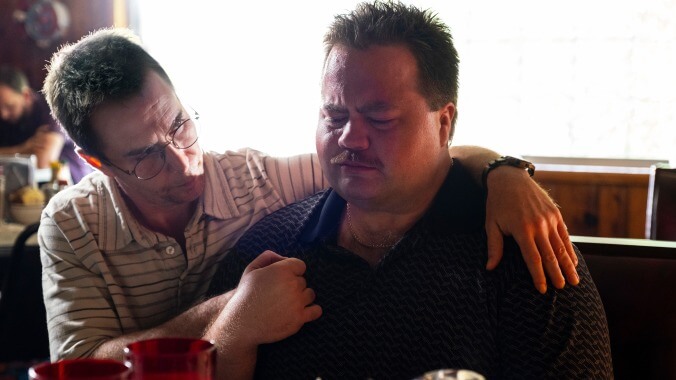Clint Eastwood turns the sad true story of Richard Jewell into another salute to American heroism

Clint Eastwood, the oldest of the old-timers, has in recent years focused on making movies about real-life stories of momentary heroes and underestimated men (some of whom aren’t heroes at all). To this hall of guys who were in the wrong place at the right time we can now add the sad story of Richard Jewell. He was the Atlanta security guard who briefly became a national hero after discovering a bomb at a concert at the 1996 Summer Olympics. Jewell’s moment of glory was short-lived. Within days, his hometown paper, The Atlanta Journal-Constitution, broke the news that he was being looked at as a person of interest by the FBI. Soon there was a widespread speculation in the media that Jewell himself had planted the bomb, which detonated as he and others were trying to clear the area, killing one person and injuring over 100 others.
Not that Eastwood is interested in crowds. At 89, he appears to be downright sick of directing them. In Richard Jewell, he makes no attempt to hide his contempt for gatherings of more than five people, whether it’s a crowd at Olympic Park doing the “Macarena”; a mob of reporters camping outside the apartment where Jewell (Paul Walter Hauser) lives with his protective, dog-loving mom, Bobi (Kathy Bates); or the unseen millions of the kangaroo court of public opinion.
It didn’t help matters at the time that Jewell fit a certain stereotype. He’d once been arrested for impersonating a police officer and had been fired from his last job as a college security guard for pulling over drivers off-campus; his earlier stint as a sheriff’s deputy had ended under similarly ignominious circumstances. He was a wannabe, an overweight mama’s boy who got tricked into an interrogation at an FBI field office by agents who told him that he was starring in a training video. He was called “The Bubba Bomber,” “The Una-Doofus,” and worse.
Written by Billy Ray (whose own résumé of behind-the-headlines stories includes Captain Phillips and Shattered Glass), Richard Jewell portrays him as an underdog and an outsider. He talks too much. He wants to be one of the good guys. He can’t stop trying to ingratiate himself to the cops and the FBI, even when they come to execute a search warrant on his homey apartment. His mother wonders whether the feds might be so kind as to remove their shoes (the apartment is carpeted), and then looks on in horror as they cart off all of her Tupperware as evidence. (It could have been used to store bomb-making materials, opines her son, ever the unwitting self-incriminator.) Even his hero moment has a touch of ridiculousness to it: He’s suffering through a bout of diarrhea when he discovers that backpack full of explosives at Olympic Park.
Much of this material, the diarrhea included, comes by way of “American Nightmare,” a 1997 profile of Jewell written by Marie Brenner for Vanity Fair, from which Ray’s script also derives its sense of quotidian Southern eccentricity, embodied by Jewell, his mother, and their short-tempered and exasperated voice of reason, G. Watson Bryant (Sam Rockwell). Bryant was a low-rent real estate lawyer who had befriended Jewell back in the mid-1980s, and ended up becoming his attorney despite a total lack of relevant experience. Like his client, he exists at the edge of caricature—the former hotshot now eking out a living in an unglamorous rented office. What’s surprising is how sincerely Eastwood treats his principals. (Or maybe it isn’t that surprising at all: Though never directly identified as such in the film, Bryant is described in Brenner’s piece as a diehard libertarian.)
In his recent men-in-crisis movies, with which Richard Jewell is very much of a piece, Eastwood has toyed with biopic conventions; the results have ranged from terrific, as in Sully, to embarrassing, as in the docudrama experiment The 15:17 To Paris. But here, he largely plays it straight. As in so many of his films, the underlying subject is the abuse of power, represented by the director’s favorite pointy-headed nemeses, the media and the FBI. Operating under the logic that a story about heroics needs a villain, Richard Jewell concocts one in the form of Kathy Scruggs (Olivia Wilde), the Journal-Constitution crime reporter who co-wrote the front-page story that precipitated Jewell’s public vilification.
Scruggs is depicted as a scoop-chasing sexpot who is literally in bed with the FBI, having been tipped off about the bureau’s suspicions about Jewell from Tom Shaw (Jon Hamm), her friend-with-benefits at the Atlanta division. To be honest, the parts of the film that deal with Scruggs and her colleagues at the Journal-Constitution are awkwardly deployed and often laughable; a scene where Bryant comes to the newspaper office to berate Scruggs in person plays like rancid Aaron Sorkin. Which is to say that the film is at its creakiest and clumsiest when it tries to preach its core themes—the overreaching of the press and the government—and at its most humanizing when it simply focuses on giving space to the kind of characters who rarely get a starring role.
One has come to expect uneven and off-key performances in Eastwood movies, but that’s not the case here. In Richard Jewell, his subdued, no-nonsense directing style is buoyed by the strongest cast to grace one of his movies in some time. (Even Wilde and Hamm are very good in awkwardly written roles.) Like so many of the works of Eastwood’s long late period, Jewell offers a story without much of an endpoint, with an uplifting coda that feels almost as jarring as the ending of American Sniper. But somewhere within its surprisingly pacey two-plus hours is a compelling group portrait of ordinary oddballs in cruel circumstances; it relays Eastwood’s appreciation for individuals over masses better than any speech ever could.